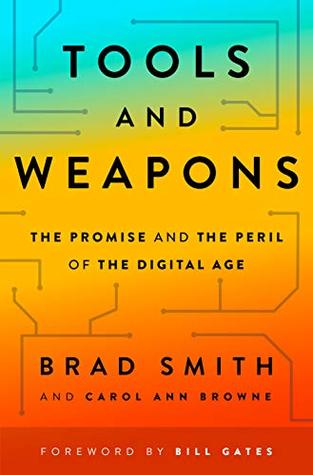More on this book
Community
Kindle Notes & Highlights
by
Brad Smith
Read between
December 22, 2019 - January 6, 2020
Some say that data has become the oil of the twenty-first century. But that understates the reality. A century ago, automobiles, airplanes, and many trains ran on oil. Today, every aspect of human life is fueled by data. When it comes to modern civilization, data is more like the air we breathe than the oil we burn.
How do we strike the right balance between public safety, individual convenience, and personal privacy in this new era? How do we protect ourselves from cyberattacks that are using this technology to disrupt our countries, businesses, or personal lives? How do we manage the economic effects that are now rippling across our communities? Are we creating a world that will have jobs for our children? Are we creating a world we can even control?
Since the dawn of time, any tool can be used for good or ill. Even a broom can be used to sweep the floor or hit someone over the head. The more powerful the tool, the greater the benefit or damage it can cause. While sweeping digital transformation holds great promise, the world has turned information technology into both a powerful tool and a formidable weapon.
When your technology changes the world, you bear a responsibility to help address the world that you have helped create. This might seem uncontroversial, but not in a sector long focused obsessively on rapid growth, and sometimes on disruption as an end in itself. In short, companies that create technology must accept greater responsibility for the future.
Governments serve constituents who live in a defined geography, such as a state or nation. But tech has gone global, and we have customers virtually everywhere.
“If data is collected, it can always be abused,” he said. “It’s important that, as we operate around the world, we remember that governments can change over time. Look what happened here. Data collected about people—their political, religious, and social views—can fall into the wrong hands and cause all sorts of problems.”
“Ireland is to data what Switzerland is to money.”
This is a fundamental fact of life that everyone who works in the tech sector needs to remember every day. We’re fortunate to work in one of the most lucrative economic sectors of our lifetime. But the money at stake pales in comparison to the responsibility we have for people’s freedom and lives.
Despite our urgings, discounts, and free upgrades, some customers stuck with the old operating system. As we sought to move the installed base forward, we eventually decided that we would continue to create security patches for the older systems, but unlike with newer versions, we required that customers purchase them as part of a subscription service.
Yep, this is all how enterprise software makes MONEY. Depreciation of features and APIs that stodgy integrations on your platform depend on then charging massive amounts for bespoke support is sadly a capitalistic maneuver that works time and time again.
Repeatedly over time, technology has made the world a smaller place, but people are less connected with those living next door or under the same roof.
According to its latest data, 35 percent of Americans report that they don’t use broadband at home—or roughly 113 million people.7 And even the FCC’s own subscription data indicates that 46 percent of American households fail to subscribe to the internet at broadband speeds.8
Suddenly the Seattle area had evolved from the Emerald City to Cloud City. Between 2011 and 2018, median home prices increased by 96 percent, while median household income rose by only 34 percent.32
As a general principle, it seemed more sensible to ask an elected government to regulate companies than to ask unelected companies to regulate such a government.
Take a photograph of a tiger in the jungle. Americans are more likely to focus on the tiger and what it can do. The Chinese are more likely to focus instead on the jungle and the way it influences every aspect of the tiger’s life. Neither approach is wrong, and arguably a combination of the two could be most valuable. But the differences are clear.
AI is unlike singular inventions from the past such as the automobile, the telephone, or even the personal computer. It behaves more like electricity in that it powers tools and devices that run almost every aspect of society and our lives.
You don’t hear any serious suggestion that the Federal Aviation Administration should leave aircraft unregulated because they are too complicated for people in government to understand.10 The flying public would not stand for it. Why is information technology fundamentally different, especially when many of an airplane’s components are now based on it?
These issues are bigger than any single person, company, industry, or even technology itself. They involve fundamental values of democratic freedoms and human rights. The tech sector was born and has grown because it has benefited from these freedoms.


